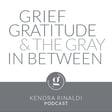
A Caregiver's Journey Through Love and Loss with Tony Stewart
Tony Stewart has made award-winning films for colleges and universities,, written software that received rave reviews in The New York Times and the New York Daily News, designed a grants-management application that was used by three of the five largest charities in the world, and led the development of an international standard for the messages involved in buying and selling advertisements, for which he spoke at conferences across Europe and North America. Carrying the Tiger is his first published book.
Tony and his late wife Lynn Kotula, a painter, traveled extensively in India and Southeast Asia, staying in small hotels off the beaten track and eating delicious food with their fingers when cutlery wasn’t available. Inspired by the experience of writing Carrying the Tiger, Tony is now studying to become a Certified Grief Educator.
Show Highlights:
•Tony Stewart, author of Carrying the Tiger, shares his deeply personal memoir, chronicling his wife Lynn's 6.5-year battle with stage four cancer and his profound grief journey.
•Discover how Tony's daily writings to friends on CaringBridge evolved into his book, serving as a "love story told almost entirely by actions" that allowed Lynn to live fully despite her illness.
•Hear Tony describe the final weeks of Lynn's life in home hospice as "the best two weeks of my life," a "miraculous" time of deep physical care and spiritual connection.
•Learn about Lynn's powerful and comforting last words: "Don't bother me. I've got a lot to do," which left Tony with a sense of mystery and spiritual insight.
•Tony bravely discusses finding new love after immense loss, and the complexities of honoring Lynn's memory while opening his heart to a new relationship.
•Explore the meaningful origin of the book's title, "Carrying the Tiger," which stems from a Tai Chi concept of facing and making challenges less threatening.
•Gain insight into why Carrying the Tiger is described by readers as an inspiring and joy-filled experience, rather than a depressing one, despite its difficult subject matter.
Reachout to Kendra Rinaldi to be a guest or have her as a guest https://www.griefgratitudeandthegrayinbetween.com/


